Monday Feb 23, 2026
Monday Feb 23, 2026
Thursday, 13 June 2019 00:00 - - {{hitsCtrl.values.hits}}

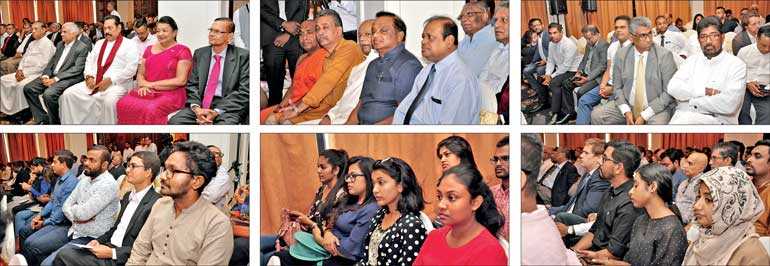
By Shanika Sriyananda
The Easter Sunday suicide attacks by the Islamic State (IS) happened not due to lapses in intelligence services, but due to the divided leadership, international counter terrorism expert Prof. Rohan Gunaratna said last week.
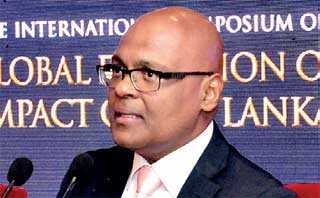 |
Co-Author of 'The Three Pillars of Radicalization - Needs, Narratives and Network' Prof. Rohan Gunaratna |
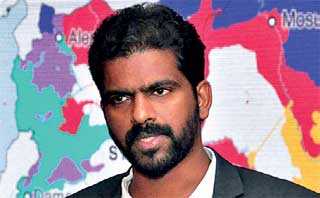 |
Author of 'The ISIS Caliphate' and The Hindu International Affairs Editor Dr. Stanly Johny |
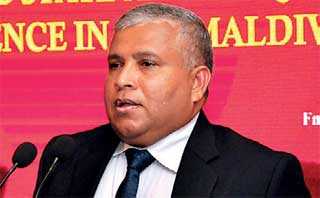 |
Former Maldives Nation Defence Force Defence Intelligence and Counter Terrorism Department Head Brig. Gen. Ahmed Nilam |
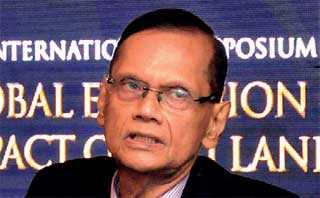 |
Prof. G. L. Peiris |
“During this period, we had two major problems in this country, where the political leadership was divided. There was no collective and visionary leadership, and we cannot blame the Sri Lankan security and intelligence services for this attack,” he claimed.
He said that Sri Lanka fought terrorism for over 27 years, and it had one of the most capable military, law enforcement and intelligence services in the world, and they should not be blamed for the Easter Sunday attacks.
Prof. Gunaratna, who said that he had seen the original intelligence reporting, said that it was very rare that a country would receive such precise information of an impending attack, which even mentioned the churches as the target, suicide as the mode of attack, and Zahran’s group as the perpetrators.
He said that the indomitable spirit of the members of the security and intelligence services had been taken away by the present political leadership, which had turned them from hunters to fishermen.
“Before 2015, those who worked in the office were hunters, and they waited for the names like Zahran Cassim to emerge, to hunt them relentlessly and bring them to justice. But, after 2015, their mindset had been totally changed from being a hunter to a fisherman, who will put a rod and wait for the terrorists to come. It is not the failure of intelligence, but a failure of the leadership that resulted in those attacks,” Prof. Gunaratna claimed.
Addressing a packed audience, where Prime Minister Ranil Wickramasinghe, Opposition Leader Mahinda Rajapaksa, Speaker of the Parliament Karu Jayasuriya and several other politicians of the ruling party and the Opposition, academics, and diplomatic officials participated at the inaugural talk series of the Mahinda Rajapaksa Centre for International Studies, he urged the political leaders to take the responsibility of losing over 250 lives, injured over 300 at the Easter Sunday suicide attacks.
At the international symposium on ‘The global expansion of ISIS: Impact on Sri Lanka’, former Brigadier General Ahamed Nilam from Maldives and author of ‘The ISIS Caliphate’ Dr. Stanly Johny also spoke about the IS threat in the South Asian region.
“I visited the St. Anthony’s Church, Kochchikade and then Cardinal Malcolm Ranjith. Both of them told me that they were not informed or alerted by the Government that the churches were under terrorist attacks. This is a fatal mistake and our leaders must take responsibility for this,” Prof. Gunaratna, who was among the first to inform the presence of the IS in Sri Lanka, said.
“I ask all of you, especially the parliamentarians, do not smile again until you bring the laws necessary to secure this country. If you have done your task, this attack would not have happened,” he stressed.
He said it was true that the Deputy Inspector General of the Ministerial Security Division informed 225 principal staff officers, diplomatic core, judges, personnel security officers of former Presidents Mahinda Rajapaksas and Chandrika Bandaranaike Kumaratunga, and also the security officer of a former first lady Mrs. Premadasa, but they didn’t inform the churches.
Speaking on the current threat posed by the IS in Sri Lanka, and links of the Sri Lankan IS to IS central in Iraq and Syria, he explained how IS evolved, its attacks, attacks launched in response to attacks, and what Sri Lanka can do in the long-term to counter the threat of the IS in Sri Lanka and also in the region.
According to Prof. Gunaratna, there were three IS networks that operated in the Central, Eastern and Western provinces in Sri Lanka.
Its first network was set up in the Central province by Mohammed Muhsin Nilam alias Abu Shurayh. Forty-one members had travelled to Syria and Iraq. He was recruited by his brother Abu Ishak, who worked for a humanitarian agency in the UK and Tanzania. He got radicalised in UK and later returned to Sri Lanka and radicalised two Kandy-based families - his own family, known as the Mushin family and his wife’s family, known as the Thajudeen family.
“They travelled to Syria also with their wives and children. After six months in Syria, Nilam got killed. The news about his death was claimed in a magazine called Dabiq and the world came to know that a Sri Lankan foreign terrorist was among IS fighters in Syria and Iraq. Since then those IS members who travelled to Syria and Iraq have started recruiting people in Sri Lanka,” he said, revealing the information about the Kattankudy-centric Eastern network led by Jaharan Cassim, who had recruited 150 members in the Eastern province.
Prof. Gunaratna said that although media named him as Zahran Hashim, his real name was Jaharan Cassim, who studied in two Arabic schools in Sri Lanka and later founded an organisation called Darul Adahar with its deputy leader of the IS network Naufer Maulawi, who has been arrested in Dambulla and now in custody.
In the Western province, another IS-centric organisation called Jamiyathul Millathi Ibrahim Fe Sylani (JMI) emerged. In Syria and Iraq, Sri Lankans were identified as Sylani. The latest Sri Lankan foreign fighter killed in Syria is Abu Ishak, who was killed in Baghouz early year.
He said that the Western province network - JMI - had a dispute among its members - those supporting Al Qaeda and IS. JMI leader Umair was of the view that was not the right time for Jihad when they wanted to attack churches and hotels on Easter Sunday.
“There were two others - Ilham and Latheef Jameel - who broke away from JMI. Those who said that Jihad could be waged at any time got united with Zahran. Then they created the IS network in Sri Lanka, which is named Dawala Islamiyah fi Sylani, which means Islamic State branch in Sri Lanka,” he said explaining how IS functions in Syria and Iraq and its tentacles in Sri Lanka.
Prof. Gunaratna, who worked in Iraq twice in the height of the insurgency, interviewed many insurgents in Iraq, and edited three books on IS, said the IS was created in Iraq by a man who had a very similar trajectory to Zahran Hassim. “Abu Musab al Zarqawi, a criminal who was imprisoned in the prison in Zarqa, was born in Jordan. He was radicalised by a cleric called Abu Mohamed Al Maqdisi, and later both of them travelled to Afghanistan and received funding from Osama Bin Laden. They created their own training camp on the border of Iran. When the Americans intervened in Afghanistan in October 2001, just one month after the 9/11 Abu Musab al Zarqawi moved from Afghanistan to Mashad to Tehran to Khurmal in North Iraq, from where he fought against the American forces, which intervened in Iraq in 2003. The founder father of IS, Abu Musab al Zarqawi, named his group Tawheed Wal Jihad, which was the model to form the National Thowheed Jamath in Sri Lanka by Zahran. This proves the very links in the organisational structures of the IS. Zahran’s main communication with IS Central was through Jamal Latheef,” he explained.
However, the ISIS had changed its name to IS in 2014. The first IS leader was Abu Musab al Zarqawi, then it was Abu Umar al Baghdadi, and the present leader is Abu Bakar Baghdadi, who claimed the attack in Sri Lanka.
According to Prof. Gunaratna, anyone who takes a pledge from the leader, wants to die as he is being ideologically made to believe in five things: that they will go to heaven; will have an audience directly with God; will be forgiven for their sins; they can take 70 relatives with them; and lastly, each one will be given 72 girls to live in heaven eternally.
“Some of the close relatives of Zahran’s group, who believed in the fourth which says they can take their relatives with them to heaven, had supported the suicide bombers and blew themselves. The pregnant woman who died with her two small children on the Easter Sunday attack, demonstrates the new trend of IS’s radicalisation process, which is an institutional radicalisation and is different from all other groups. They radicalise their wives and children. In Bangladesh by two sisters - one in Australia - carried out attacks, in Indonesia, three families got involved in suicide attacks, and in another incident in Indonesia after husband got arrested, when the officials of the Indonesian Counter Terrorism Unit went to the home, the wife blew up herself with the children. In last January, a beautiful cathedral in the Philippines was blown up by a radicalised couple. These incidents demonstrate that IS radicalise entire families, not only the individuals in families,” he said.
Playing the video where Zahran and his suicide bombers were pledging allegiance to Abu Bakar Baghdadi, Prof. Gunaratna said they had pledged him that they would serve God, Muslims and Islam, and this is a fight for faith and the faithful.
Spelling out immediate measures and long-term strategic responses to address the IS extremism in the country, he urged Muslim families, which are the first line of defence to fight against terrorism, to be vigilant and alert on any suspicious act or behaviour or change in attitudes of their family members, and to direct them to counselling centres which should comprise of Muslim religious leaders, psychologists and social workers.
“Two months after the attacks, we have overwhelmingly focused on military response - hunting and capturing the terrorists, which is vital and essential. But this is only a short-term response; we need a long-term strategic response, where our leaders are still lacking the vision to develop in our country,” he said.
Meanwhile, he said that the radicalisation or the ecosystem that produced Zahran is still intact, and to break that system the Government needs to bring the National Security Act, which should have six elements, including criminalising hosting and posting extremist contents, hate speech and incitement to violence.
“Why criminalising hate speech and incitement to violence is very important at this juncture? No one becomes a terrorist overnight, as there is a cycle where a terrorist is born. It is based on suspicion, prejudice, resentment, hatred, incitement and violence. There is so much of hate speech in the Sri Lankan cyberspace and it is high time that the Government to create a hate-reporting network, which is the primary responsibility of fighting terrorism of this Government. The fight against hate speech should have been addressed a long time ago,” he stressed.
Prof. Gunaratna also claimed that the religious space has been exploited by terrorists and extremists, and Zahran was known by the Terrorist Investigation Department, State Intelligence Service and the Military Intelligence as an extremist, not as a terrorist.
“But we do not have a law that can be used effectively on the ground to arrest people like Zahran, and that is why it is vital for the Government to develop the legislature now. There is no point of having all those politicians in Parliament, if they cannot pass the proper laws. Today, a month has passed after the attack, and it is your responsibility to create laws that are vital to break that ecosystem for terrorists,” he said, recalling how the previous Government deported over 200 Muslim preachers amidst agitations by the human rights groups and civil societies.
He said that doors should not be opened for radical preachers as they have no dealings with the traditional Sri Lankan Muslims who have a Sri Lankan Muslim heritage, which has also subjected to changes with the influences from the Middle East.
“They have influenced our Muslim men to get their women to dress like Arab women, schools funded by Saudis, and put boards written in Arabic. The Government should have never allowed them to bring the Middle East here. Those Arabian countries are our friends, but we cannot replace our culture with the Arab culture. The Arab world is burning and we cannot afford to burn our country,” he said.
Prof. Gunaratna emphasised to implement a system with the Ministry of Religious Affairs to issue licenses for preachers to practice their religion here, and it should be renewed every two years, and not to allow extremist preachers to enter into Sri Lanka.
He said all religious preachers, including Buddhist monks, who preached against another faith or insulted another faith or a religion should be punished.
“We have to protect the Muslims, but we must also regulate the religious space, which is paramount for the security and stability, so that these extremist ideologies do not enter into the country. We are a plural society, and a tolerant form of Islam existed in this country. The strains that came from Tamil Nadu Thowheed Jamath by a person called PJ and the IS in the Middle East damaged the country‘” he said requesting the Speaker Karu Jayasuriya to introduce a framework to regulate religious space.
He also requested the Government to have multi-ethnic schools, instead of separate schools for children from each ethnic group in the country. “If we continue to have such schools we will be producing Buddhists, Hindus, Muslims and Christians but not Sri Lankans,” he observed.
Prof. Gunaratna said that the politicians in Parliament today who hold responsible posts should also take the responsibility of bringing new laws to build security structures, to create interventions to disrupt environments that produce terrorists, as those attacks happened during their stint in the Government.
Prof. Gunaratna also suggested to design rehabilitation programs for those who have been arrested to commence religious and spiritual rehabilitation, social and family rehabilitation, creative art in rehabilitation, recreational rehabilitation, and psychological rehabilitation to build bridges among communities as the relationship between the Sinhalese and Muslims is not the same now.
“The terrorist attacks have damaged our relationships, but the Muslim political leaders spoke nonsense on television. I was ashamed to listen to them, who said they are keeping swords to protect their women, and also to cut grass. This showed the level of their intellect and understanding of national issues. That infuriated the people of this country,” he said, adding that mob attacks on Muslims had happened as the country’s cyberspace is not properly managed.
According to Prof. Gunaratna, with the IS shifting and expanding their battlefields to Asia, where over 63% of Muslims live in Central Asia, South Asia, South East Asia, and North East Asia, the Government has to build security and intelligence systems to fight this threat, and also to monitor who is coming in and going out from Sri Lanka to other countries.
He said that the security and intelligence services need to build common databases with the Indians, Maldivians and other nations, share security intelligence, exchange personnel between these countries, joint training with those countries, conduct joint operations and share experiences, expertise and resources.
Referring to the sleeper cells, he said they will remain underground due to ongoing operations, adding that the operational cells were dismantled thanks to the rapid measures taken by the security forces, but it is very essential to maintain a certain level of security, as there is no full guarantee that the entire network has been fully dismantled.
“IS is a secret organisation, where they are compartmentalised in their operations and they function very secretly. There can be unknown unknowns, and that is why it is important for the Government to restore certain security and intelligence capabilities, and the public should be alert and vigilant to prevent them from striking back,” he disclosed.
Prof. Gunaratna said that regional security and intelligence services, as well as the Five Eye, the biggest security and intelligence network that is called AUSCANUKUSNZ - Australia, Canada, UK, US, New Zealand and UK, India, and Maldives are aware of the general IS-centric threat.
“It is important for Sri Lanka to move from counter-terrorism cooperation to collaboration, to work together with so many other nations to fight this scourge of terrorism, as when those countries work jointly, the terrorists cannot move or communicate well,” he said.
“There is a geopolitical composition between Americans and the Chinese, and Sri Lanka must develop equidistant foreign policy, as we cannot afford to have greater friendships with any of these countries, we should have friendships with everyone and we should have no enemies. If we are not careful after these attacks and permit foreign troops to have a base here in Sri Lanka, our country will suffer. This is why it is so important for us to get Chinese assistance to develop the country, get the American technology, which is 20 years ahead of Chinese technology, to work with us, and also to work very closely with India, our immediate neighbour,” he remarked, adding that Sri Lanka should not antagonise any of these countries, but need to look into Sri Lanka’s national interest and not be driven by foreign interests.
Prof. Gunaratna stressed on regulating the country’s financial space to channel the funds that are coming into NGOs and other institutions through a proper authority, to make them declare their funding sources and ways and means of using the funds in their projects.
“The funds for the Easter Sunday attackers were mostly generated locally. We must pay extraordinary attention to the flow of funds, because most of those funds were locally generated. But, there can be foreign funding in the future, and therefore it is vital our financial intelligence units are well integrated to review the funds that are coming into the country,” he said.
He also said that the Government should invest very significantly in cyber intelligence or digital intelligence, which is key for strengthening State intelligence, military intelligence and police intelligence, to monitor the IS.
“If we had effective cyberspace intelligence networks, those suicide attacks could have been detected early. Our intelligence is based on traditional human intelligence in the physical space, and to break the well-organised IS network, the Government needs greater intrusion and penetration capabilities into their communication, as IS is not just a group but a community trying to recruit sympathisers to support their extremist ideology,” he said.